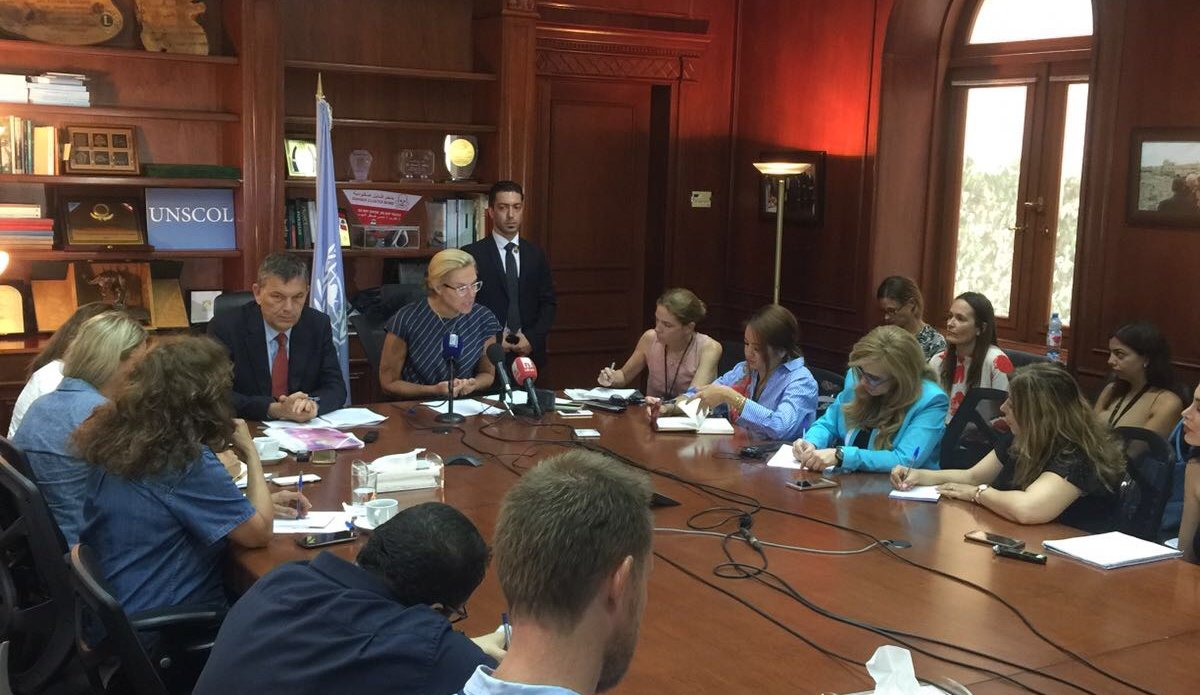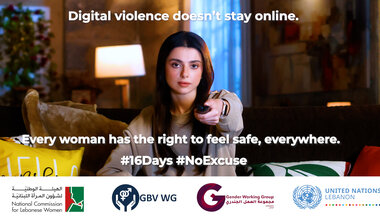UN Special Coordinator Sigrid Kaag and Deputy Special Coordinator Philippe Lazzarini Meet the Press
UN Special Coordinator for Lebanon Sigrid Kaag and Deputy Special Coordinator, Resident and Humanitarian Coordinator Philippe Lazzarini held today a dialogue with the Beirut-based media on the UN’s role and priorities in Lebanon. Focus was on the UN’s “whole of Lebanon approach” that takes into consideration support for Lebanon’s peace and security, stability and stabilization.
Special Coordinator Kaag underlined the focus on prevention in the UN’s work for Lebanon. “Prevention is not only conflict prevention. It is more than that. It is really looking at combating poverty, prevention of violent extremism, working with the security apparatus, strengthening in particular respect and compliance with all human rights standards and norms, conventions,” she said. She welcomed the progress made in the reactivation and functioning of state institutions following the election of President Michel Aoun and the formation of the government.
“Prevention also means that we continue to seek opportunities to make progress on the implementation of Security Council Resolution 1701,” Ms. Kaag said. She added that she will be briefing the UN Security Council on 20 July on Lebanon as a whole as well as the implementation of resolution 1701. She said one of the messages will be the need for both parties to avoid rhetoric or any step that could lead to miscalculation in a volatile regional environment.
She referred to efforts through the International Support Group for Lebanon, including particularly to support the Lebanese Armed Forces. Regarding the events of last Friday in Arsal and developments since then, Ms. Kaag said, “We are in contact with the Lebanese authorities to ascertain the conditions of arrest but also the demise of four detainees so far. We do not have exact data. But it is also important to remember that the UN condemns all acts of terror or attempts at acts of terrorism.” There is also always a need to make a clear distinction between militants and civilians and the importance of continued protection and assistance and respect for the human rights of all, she said. “We extend our continued appreciation and gratitude not only to the Lebanese Armed Forces and Security apparatus but also to the Lebanese people in hosting the Palestine refugees as well as the Syrian refugees. We need also to be mindful of the fact that the refugees are civilians who are being shielded, thanks to Lebanese generosity from conflict just across the border,” Ms. Kaag added.
On Lebanon’s exclusive economic zone, the Special Coordinator said the UN is playing a good offices role. “We see the oil and gas file as a potential confidence building measure between the two sides, we see in it shared economic interests. We also consider it of course an element of future risk reduction, if and when conditions are met and the two parties can move forward.” But Ms. Kaag reiterated that the UN does not pronounce itself on the status of territories, on the delimitation of boundaries, or on issues related to entitlement to natural resources, unless it is mandated to do so by a competent United Nations organ or is otherwise requested by all the parties concerned.
Ms. Kaag regretted the absence of a women’s quota in the new electoral law but hoped that all parties would ensure a meaningful participation of women candidates in the elections.
In turn, Deputy Special Coordinator/Resident/Humanitarian Coordinator Lazzarini focused on the UN’s support to Lebanon’s stability and socio-economic stabilization, including from the impact of the Syrian crisis and over 1 million Syrian refugees in Lebanon. “When we met in Brussels (in April), we said collectively what we have done has not been sufficient to reverse the tide. …Hence, we need to have a new approach to complement our collective effort in the country,” he said. “The only way to try to reverse the tide under these circumstances is to create growth, to create jobs, for the economy and if we are creating jobs this will benefit equally both the Syrians and the Lebanese here. That’s when we started to talk and we are engaged with the Government about modalities of what more needs to be done in terms of investment, the Prime Minister also talked about this Capital Investment Plan, investing in infrastructure and also trying to position as a country for possible future reconstruction in the region, Lazzarini added.
Regarding the funding for Lebanon, Lazzarini said Lebanon received in 2016 about $1.6 billion of international assistance, primarily humanitarian grants but also some development grants. In Brussels, the international community committed the same for 2017, he said. But he noted the slow disbursement of grants and commitments made and stressed the need for predictability.
Regarding the issue of refugee return to Syria, SCL Kaag and Mr. Lazzarini reiterated the UN position that any return of refugees to the country of origin be voluntary, be done in conditions of safety and dignity. “This is a central principle of international law. Whether or not it will be possible to have in Syria in the near future areas where refugees will be willing to go back, it’s something impossible to answer right now. We seem to be far from having it at that level, because the situation remains very fragile and the conflict continues in a very dramatic way.” The UN Secretary-General has also been clear that it is important to have sustained support for countries such as Lebanon, Jordan and Turkey as well as the refugees themselves. Ms. Kaag stressed that there is no talk of the permanent settlement of refugees in Lebanon. “It is always temporary,” she stressed.
 UN
UN





